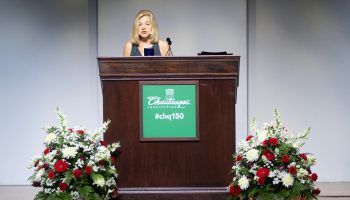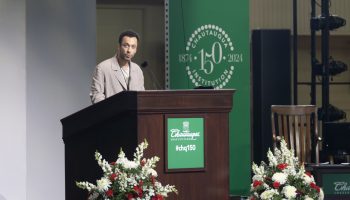NICK DANLAG – STAFF WRITER
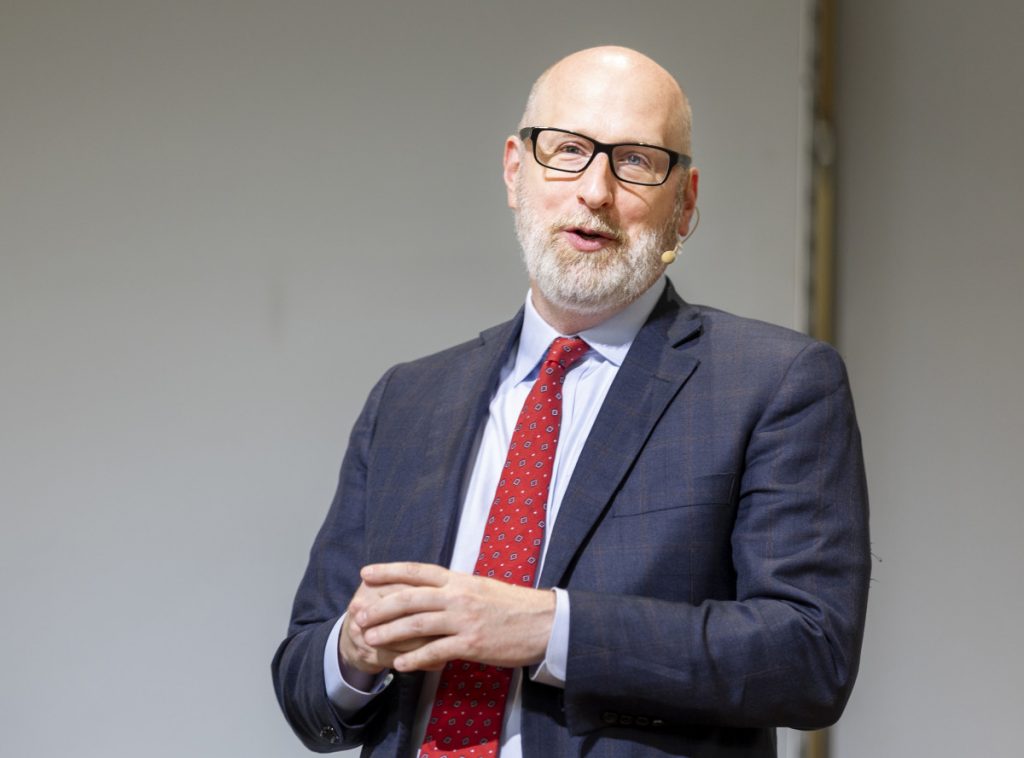
David French hopes he was wrong. The thesis of his book, Divided We Fall: America’s Secession Threat and How to Restore Our Nation, was that every force in the United States is pushing people apart more than they are pulling together.
“When I wrote my book, I thought, ‘Lots of people are going to think I’m too alarmist,’ ” said French, a journalist and author. “Now, when I talk about the book, the question I get is: When is it going to happen?”
Even with the pandemic, when society had a singular enemy in COVID-19, cultures were warring.
“It might be the most remarkable cultural war in the history of the culture wars: over whether or not to wear a mask in a pandemic spread by droplets in the air,” French said. “Ten to 15 miles south from where I live, if you wore a mask, you could be smeared in public.”
As well as being an decorated author, French is the senior editor at The Dispatch and a columnist for Time. During his lecture, “Divided We Fall: Understanding and Healing a Broken Land,” at 10:30 a.m. Tuesday, July 20 in the Amphitheater, French discussed three major causes of increasing polarization; he said the way forward was healing the heart of America, though this process will take multiple years. This was the second lecture of Week Four of the Chautauqua Lecture Series’ theme of “Many Americas: Navigating Our Divides.”
We can be the seeds of something new. We can be the seeds of renewal.”
– David French,
Senior editor,
The Dispatch
Big Sort and Overton Window
Recently, The New York Times released an online test that showed how dense people’s ideological bubbles are. It works by checking voting records and party memberships by state and county.
So French checked how big his own bubble is and realized that his area is 85% Republican. Then he checked other places he has lived, from Manhattan and Philadelphia to Tennessee and Alabama, all of which were 85-90% a particular party.
“I’ve lived in nothing but a bubble,” French said.
This is part of the “big sort,” which French defined as people naturally becoming stuck in ideological bubbles, based on geography, political affliction and other factors.
Eighty percent of Americans live in ideological bubbles because of people’s tendency to choose to live in places with like-minded neighbors. French said this is a large reason that most districts in the U.S. are “landslide districts,” meaning that they vote for a particular party or candidate with 80% of the surrounding population.
And this phenomenon doesn’t end with elections and politics. French said that TV viewership can be mapped using ideological views of the audience, such as the biggest show on television for many years, “Game of Thrones,” which was primarily watched by Hillary Clinton voters.
“By itself, it’s benign. By itself, it’s very understandable,” French said. “You tend to like people and like to be around people who share your common interest. It’s just human nature.”
Coupled with the big sort is the Overton Window, which refers to the concepts that are inbounds and outbounds for a particular conversation and group of people, meaning that there are acceptable words a person can use in conversation.
A positive effect of the Window is that it gives society a common language to discuss complex issues and has largely eliminated the use of blatant hate speech and racist terms in popular discourse.
“We have now moved into team red and team blue so sharply that in many areas we don’t even have one window anymore. We have two windows of discourse,” French said. “So that the language that you use in one community disqualifies you from even consideration … in the other community.”
However, French has experienced the negative effects of the Overton Window, on both sides of the aisle. He said that if he uses the term “systemic racism” in more Republican crowds, then all the ears will shut.
“If you talk about systemic racism as a concept (to those audiences), you are then outside the bounds of acceptable discourse; you have identified yourself as a member of the opposition and you are not somebody worth listening to,” French said.
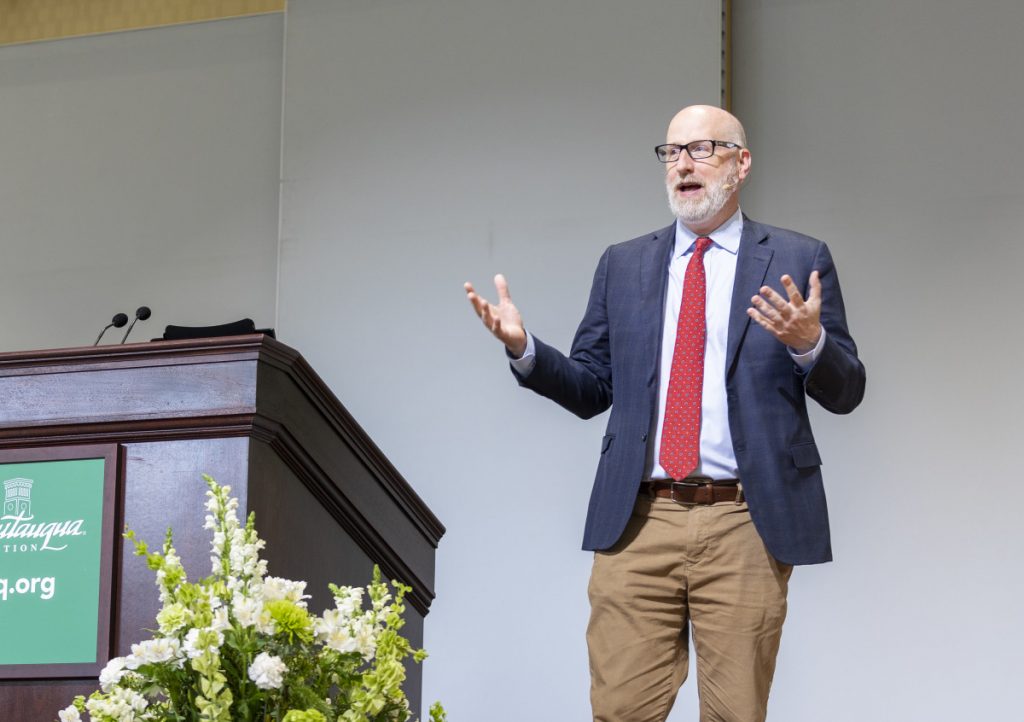
Law of Group Polarization
French defined the Law of Group Polarization as the tendency of groups of like-minded people to become more extreme when they gather.
“If you go to a meeting that is designed to combat climate change, and you’re brainstorming ideas for things you can do in your community to combat climate change,” French said, “are you going to leave the meeting less concerned about the state of the planet? No.”
This can cause every member of the group, after the gathering, to become more extreme than the most extreme member before the meeting, which French called a cascade. He said this was prominently the case with President Donald Trump.
“I was living in rural Tennessee when the rise of Trump occurred,” French said. “In fact, the identification, and the affiliation, and zealous loyalty to Donald Trump was evidence of this cascading effect upon polarization.”
French said that some of his neighbors went from saying Trump was their last choice for president, to supporting the president avidly.
While in years past, graphs of American ideological views had a bell curve, with the majority in the middle and a few at the extreme left and right, French said the graph now looks like a “U.”
“Even large-scale differences can be manageable, if not accompanied by large-scale animosity,” French said.
Many people are now more motivated to vote by a distrust of the opposing party than they are by faith in their own party. French said 82% of Republicans strongly or somewhat disliked Democrats, while 78% of Democrats strongly or somewhat dislike Republicans. And 20% of America would be OK if a large percentage of the opposing party died — “I’m not saying they would kill them,” French said; rather that those respondents think if those with whom they disagree “just went away,” things would be better.
“Twenty percent of Americans are now ascribing dehumanized characteristics, animalistic type characteristics to their opponents,” French said. “And it’s not the quiet 65 million.”
And social media is doing little favors. French said social media has nationalized “all our beefs, all our dramas.” Even in times of great national strife, local events mainly stayed local, such as in 1968, when French said there were two to three political bombings a day in the U.S., yet the national newspapers rarely covered them.
Now, people can see almost everything in real time.
“So what ends up happening is we have instant access to every political atrocity in the United States. No, no, that’s not actually correct,” French said. “We have instant access, because of our curated feeds, to every atrocity committed by another side.”
French defined this as nutpicking, when people take an extreme example and portray it as typical. One example of this was when First Lady Barbara Bush died. While most people from both sides of the aisle mourned the beloved mother and wife of two presidents, one liberal professor from California, with a few thousand followers, tweeted she was glad Bush died.
“She becomes this symbol of all that’s wrong with the left,” French said. “So for about a week, she is the most famous professor in all of America.”
Unfortunately, Twitter and other platforms have no shortage of extremists, which French likened to “a never-ending amount of fuel.”
To combat the polarizing nature of social media, French started to follow a progressive user for each conservative he added. His bipartisan Twitter feed allowed him to realize how stark the difference was between the world conservatives and liberals saw on social media.
During the protests following George Floyd’s murder by Minneapolis police officer Derek Chauvin, French saw this divide in real time. The right side of his feed showed violence, people burning down buildings and attacking police officers.
“You would think that every city in the United States of America is being systematically destroyed and looted,” French said.
The left side of his Twitter feed told a different story: police officers attacking peaceful protesters.
French said he was not saying everyone is equally at fault.
“No, I only saw one team take the Capitol on Jan. 6,” French said. “There’s a justice to the matter here. The justice of the matter is one side tried to overthrow the government of the United States and is now in the business of minimizing that and pretending it didn’t happen. That has to be opposed.”
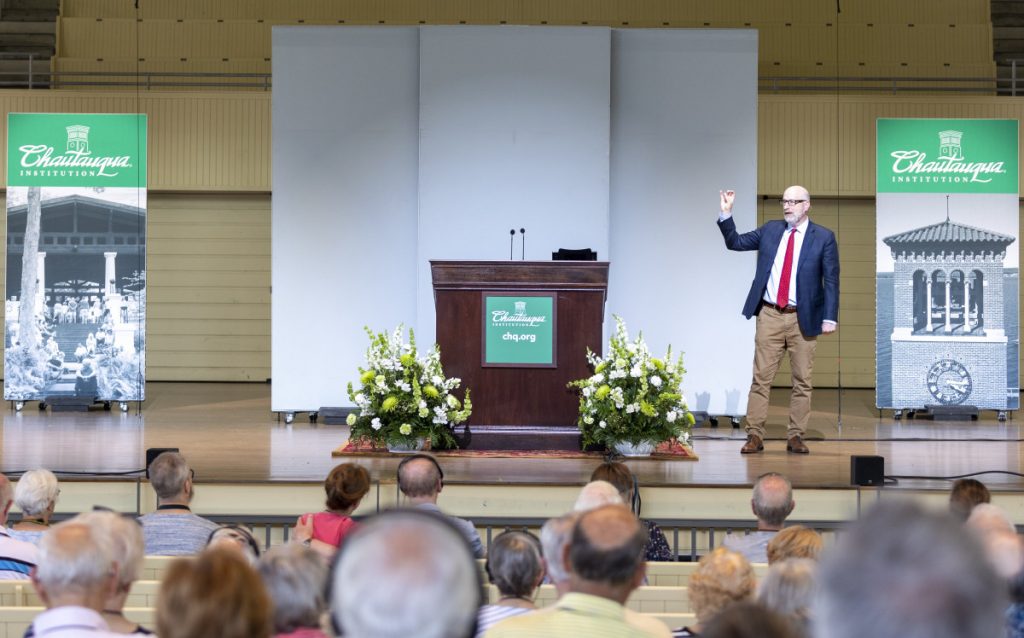
What can we do?
French said people need to recognize the reality of the state of polarization in the country. He said the U.S. needs to de-escalate partisan politics.
“That’s not going to happen anytime soon,” French said. “And the reason is we’re locked in such a partisan struggle that every conflict, as I said, is national. Every conflict is national.”
It’s going to take more than policy reforms.
“We have to have a reform at the heart level,” French said, “then dissolve this animosity and then engage with true tolerance.”
He ended his lecture with two quotes from the Bible. The first was a favorite quote of President George Washington and was featured in the musical Hamilton.
“Every man shall sit under his own vine and his own fig tree, and no one will make him afraid.” — Micah 4:4.
French said people need to know they have a place in this country and not fear for their livelihoods based on who the president is.
The second, French said, dealt with how to reach a society where everyone has their own space under a fig tree. Chautauquans knew this quote, and many of the crowd recited it along with French.
“He has told you, O man, what is good; and what does the Lord require of you but to do justice, and to love kindness, and to walk humbly with your God?” — Micah 6:8.
As part of the Q-and-A session, Matt Ewalt, vice president and Emily and Richard Smucker Chair for Education, asked French what small acts people could take.
French said to take his last Bible quote to heart, and truly love mercy.
“We can be the seeds of something new. We can be the seeds of renewal,” French said. “America has faced dark grim times and dark, grim division, and it’s emerged from the other side, not perfect by any means in any stretch of our history, but better. But better.”



